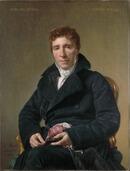
Emmanuel-Joseph Sieyès, Count of Sieyès (1748-1836), was one of the inspirers of the French Revolution. Entered as a priest, but without a religious vocation, he was passionate about the new revolutionary ideas and the social problems of his time. His political talent led him to play an essential role in the shadows. On the eve of the Revolution, the abbot was elected deputy of the Third Estate of Paris, achieving fame with a revolutionary propaganda pamphlet entitled: What is the Third Estate ?, published in January 1789, by which he convinced the deputies of the Third Estate to proclaim a National Assembly. He is credited with the text of the oath of the Jeu de Paume (June 20, 1789) and many other constitutional writings. A bad speaker, Sieyès voted in favor of the death of King Louis XVI, but remained silent during the hectic months of the Convention. To those who asked him later what he had done as a Member of Parliament during this period of terror, he replied laconically: "I survived!" As one of the five members of the Directory, Sieyès realized that the Republic was finally doomed and turned his gaze from him to Napoleon Bonaparte, who had just returned from Egypt, and established the Consulate with him. Sieyès, who inspired the Revolution in its beginnings, has the privilege of closing it too, ten years later, by leading Bonaparte to the top of the State, receiving as a reward the inheritance of Crosne and later named Earl of the Empire.




